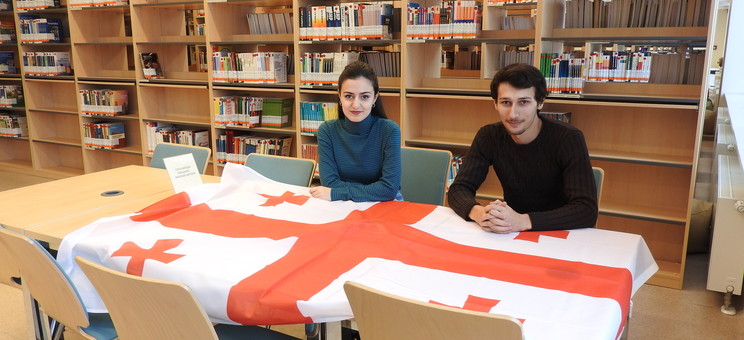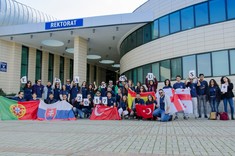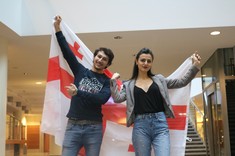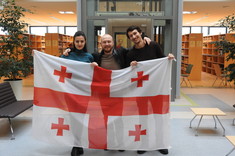Once Erasmus always Erasmus
An interview with:
Natia Goguadze, Ivane Javakhishvili Tbilisi State University. Studying at RUT, the Faculty of Management
Shalva Chubinidze, Georgian Technical University. Studying at RUT, the Faculty of Electrical and Computer Engineering
Erasmus+ students in the winter semester 2017
What encouraged you to take the opportunity and join the Erasmus community?
Natia: Since my childhood I had a dream to study abroad. I had a chance to do it when I was in High school. I went to Great Britain for a short period for a language school in Southampton and there I was so to speak infected with the crave for learning the language. After return I decided that I would like to do it for a longer period. Erasmus gives you the possibility to enrich your experience, get acquainted with different cultures, broaden your experience, gives you the chance to work in teams with other students and I see it as the best opportunity to improve your English skills. I had high marks at our university thus I won the competition and grabbed the chance
Shalva: my wish was to go abroad since I’ve never been abroad before. I wanted to improve my English skills since I never got the chance to do so while in Georgia. Moreover, such experience will be helpful in finding a better job in my home country. Also, I have been considering to look for it abroad because in my country computer scientist are not that much appreciated as they should be.
How the application for Erasmus looked like at your university?
Natia: it was not easy to be accepted for the programme because at my university there are thousands of students who want to partake in Erasmus, hence the competition was huge. First we wrote English tests, after that, those who passed had to gather the application documents like CV, Motivation Letter and Recommendation Letters from lecturers. Than we were interviewed by the selection committee and had to state the reasons for applying. The most important were our academic marks though. It was a really long way from my university to Rzeszów and Politechnika Rzeszowska, the whole process took 4 months in total and I think I was lucky.
Shalva: I was told by my lecturer who knew that I wanted to go abroad that there is a programme that I could take part in, he gave me his recommendation. Unfortunately I missed English tests but I have the IELTS certificate so my application was possible. Later all went really fast and in one month the recruitment was over. At my university there wasn’t that much competition for Erasmus. It is due to the fact that not many students want to go abroad because they do not know any foreign language, as well as in some cases students show lack of motivation.
What is the knowledge of English among students in Georgia then?
Natia: In my university most of the students who know the language had known it before they were accepted for studies. On my faculty we had only courses on B level and that is not enough to gain solid knowledge of the language.
What was the most difficult to get used to upon arrival to Rzeszów:
Natia: I wouldn’t’ say that something was really difficult for me because Poland and Georgia has more or less similar cultures so the only difficulty I could think of was the language barrier. When I had to go to a bank or post office nobody working there spoke English so at the beginning I had to take my buddy with me to translate. I was using translator at the beginning but latter on I learned some Polish words and phrases like ‘wybrac Euro z konta’ etc. The knowledge of Russian helped at times to understand Polish a bit. However, the level of l knowledge in public sector was not a surprise to me because the situation in Georgia is more or less similar.
Shalva: I am quite shy to talk in English considering my accent not to be as it should or was afraid to do grammatical mistakes but when I came to Poland I had to use language so bit by bit shyness disappeared.
How would you mark your learning process/study content and academic atmosphere at our university?
Natia: I liked friendly relations with the teachers, you could always ask if you don’t understand something for explanation. The timetables were flexible. Lessons were interesting and full of various activities. You have a very good library with the access to lots of e-magazines. I like the fact that I was given the possibility to work in the international team, with the students from other countries. It was really challenging because being form different cultures such as Turkish, Spanish Italian, Portuguese, Slovakian and Georgian we had to work together. I am also thankful for the great chance that I had to take part in International Student Seminar on Management and Financial Issues in Karvina, Czech Republic where in front of a big audience I had to present a topic in English about truism. It was really important for me to get such an experience. I would like to thank you for possibility to attend language classes I took English at C level and Polish.
Shalva: the teachers are always ready to help you out if you need it, they know modern systems and technologies. I had only laboratory classes where I could do practical things with the help of your students. For me the best thing was to get the practical experience which I miss at my home university. During my Bachelor Degree I learned only theory and such hand-on experience is really crucial.
How would you mark our city and location of it?
Natia: The city has quite good location to travel to Czech Republic, Ukraine ect. for students it has all the facilities that students need including pubs and restaurants. The cost of living here is lower than in other European cities. For students Rzeszów is quite enough.
Shalva: Rzeszów is really safe, no thieves, nothing bad happens. It has great parks to walk around or feed swans, I liked bike routes. The cost of living is comparable to Georgia.
Are there any links of your integration into our local community?
Natia: Yes. S.k. ESN prepared a project in which frames we went to High School to present Georgia, to talk about our traditions, interesting facts and culture.
Monika: your visit could also be considered as promotion of Erasmus among school pupils?
Natia: Sure, we always encourage to take the opportunity to go for Erasmus, don’t miss it because you have to do Erasmus at least one time in your life.
Do you think it is important for young people to partake in a study mobility?
Natia: yes, Georgian students need to broaden their experience, to leave the country for some time, improve language skills, see the world and different cultures.
Shalva: They need it to change their thinking and perceiving the matters. Most Georgians think that Europe is bad thanks to Russian influence thus it would be advisable for them to go abroad to take part in mobility. That experience could open their mind see Europe form different perspective and learn the good things about it and what it has on offer. The people who I know that went abroad changed their lifestyle whatsoever when they came back, taken up studies or got a well paid job.
Natia: you most of all become independent, make connections with students from different countries, learn their cultures and start thinking widely.
What is the consciousness of young people about European Union matters?
Shalva: young people are interested in EU matters but our government influenced by Russia does not show any positive aspects of the EU.
Natia: yes, but that is changing. Many students go outside of Georgia through various organizations for studies and also for placement abroad, so the way they perceive Europe gradually changes.
What did Erasmus give you personally?
Shalva: I started to obey some rules which I haven’t obeyed in Tbilisi and which is widely broken by people in Georgia that is to cross the road only on zebra crossing. In Georgia you cross the road wherever you wish, drivers are beeping at you, this is something usual for our country. At the beginning I was shy in speaking English, uncertain if I do it correctly and now I can say that I use language freely and get rid of shyness I had at the beginning.
Natia: First of all I personally grew up, become more independent, made friends with international students. I got the chance to speak in front of big audience while conference in Karvina which was challenging and gave me self-confidence in speaking English publicly. I got the chance to travel a bit around Europe. I suggest all students to take part in Erasmus, since as they say: “Once Erasmus, always Erasmus” and there is also continuation: Once in Rzeszów, always in Rzeszów”.
Monika: Thank you for choosing our university. It’s really nice to hear that you enjoyed your stay here. I hope your experience will convince other students to take up the challenge and come to our institution for the Erasmus exchange. I wish you best of luck with your personal and professional plans.
Monika Stanisz











